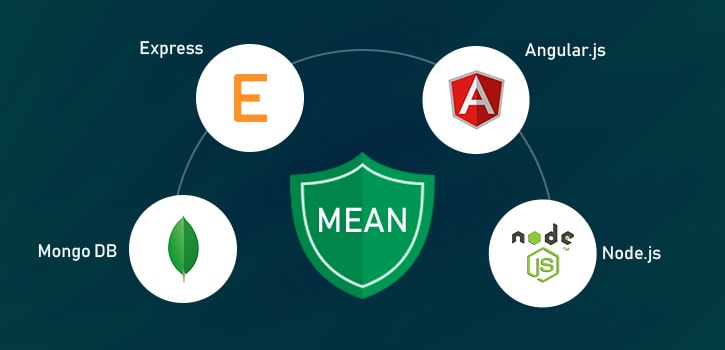Table of Contents
What MEAN Stack Development Has To Offer For Your Next Web Development Project?

To develop a robust backend, an efficient set of tools mainly designed to cut down the development time and streamline resources is essential. But, present technology poses several software stacks like LAMP, MERN, Ruby on Rails, and more. This profusion has made the stack field jam-packed.
That’s a significant reason why many developers are going for a combination of technologies to achieve superior and rapid results for mobile and web app development. MEAN stack is the chief example of combined technology. In this article, we’ll see how MEAN stack development is advantageous to the developer and the organization.
Contribution of each MEAN component
MongoDB
The critical role of MongoDB in the MEAN stack is the data storage of the application. There is no need for translation when the object moves from the application to the database and vice-versa, since both the database and the application use unilanguage, JavaScript.
MongoDB is renowned for its scalability in both storage and performance. It can guarantee fail-safe management of enormous volumes of data. It also facilitates adding fields to the database without the need to load the whole table again.
Express.js
Express.js forms MEAN stack’s backend and it is responsible for handling the communications between the database and the front end. It makes sure that the data transfer is smooth and without time delay to the end-user. It follows a minimalist approach, and hence all the processes are handled efficiently. Although it is minimalistic, it is feature-filled. Express.js makes you worry less about overwriting variables as it prevents you from redefining a variable again that you had written earlier. It saves much time and money.
AngularJS
AngularJS is a trendy JavaScript front-end framework that is used to build the user-end of the application. It ensures a smooth flow of data between the front end, backend, and database since they are developed based on JavaScript.
Angular JS is a perfect front-end framework for developers as it has easy-to-use templates and more excellent performance levels. Furthermore, you can develop both mobile and desktop apps simultaneously.
Node.js
In MEAN stack development, Node.js performs as the backbone. Express.js is developed explicitly to work over Node.js. Besides, Angular JS also links to Node.js without a glitch to enable fast data serving.
Node.js makes it simpler for developers to deploy the MongoDB database to the cloud because of its inbuilt webserver. Node.js is highly scalable, and it can support numerous connections simultaneously. It is more attuned to work with low-resource requests than high-resource requests.
Advantages of MEAN stack development technology
- Easy isomorphic coding – MEAN stack makes easy code transfer written in one framework to another. Many MEAN stack development companies are discovering new technologies that can enhance websites and applications’ developmental perfection in recent days.
- Greater flexibility – It is so flexible that the developer can test the application quickly on a cloud platform once the app development process is completed. It lets you develop, test, and launch the application without any troubles. Furthermore, you can add more information once a field is added to the form. MongoDB offers end-to-end support alongside automatic replication.
- Cost-effective -MEAN stack development needs a comparatively less number of developers. Unlike the LAMP stack, which requires developers proficient in technologies like MySQL, JavaScript, and PHP, the MEAN Stack is a highly cost-effective app development method.
- High speed and reusability – MEAN stack development deliver speedy and reusable code due to Node.js’s non-blocking architecture. Additionally, using Angular JS, an open-source JavaScript framework, provides Reusability, Testability, and Maintenance.
- Cloud compatibility – MEAN stack makes use of public repositories and libraries for the development process. The overall cost for development is also minimal when using this technology stack. Over and above that, MongoDB utilizes the app’s cloud functionalities, thus decreasing the cost of disk space.
- Open-source platform – You can do updates in the MEAN stack frequently as its components are exclusively open-source.
- Unilanguage development – using MEAN stack development is advantageous because the entire coding for development happens in JavaScript. It takes account of development from client-side to server-side.
- Simple to learn – MEAN stack has a shorter learning curve and easy for anyone – front-end developers or backend developers – to learn. It is easy to comprehend and implement during the development process.
Quality user interfaces- MEAN supports Model view controller (MVC) architecture due to which it delivers excellent user interfaces. - Huge library – Node.js has a vast library with a wide variety of JavaScript modules, which makes the web application development process with Node.js stress-free.
- Flexibility with MongoDB – MongoDB offers a flexible JSON document structure that can be utilized for data representation. It is apt for big sized projects.
- JSON usage – JSON is used almost everywhere in the MEAN stack. Both Angular and Node.js provide JSON. MongoDB, a database framework, also stores the entire data in JSON format. Also, Express JS makes use of JSON. Overall, MEAN uses JSON all over the development process to facilitate smooth data flow without any reformatting of various layers.
<h3
Developers at Tops Infosolutions are incomparable when it comes to MEAN stack development technology and their own years of experience. If you wish to build any application or website with MEAN stack technology or hire MEAN stack developers, get in touch with our experts at Tops.
MEAN stack technology keeps on advancing day by day. Many leading web and mobile app development companies are using MEAN stack technologies at length to provide trailblazing web and mobile applications for the users.
Tags